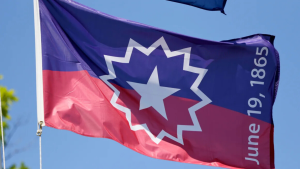None of Us Are Free Until All of Us Are Free: A Juneteenth Reflection
“You can’t separate peace from freedom, because no one can be at peace unless one has his freedom.” — Malcom X
This Juneteenth, in a country that is grappling with division and injustice, I’m reflecting on what I’ve learned over the last two years during my time at MacArthur—lessons about justice, accountability, community, and healing. I hold close to the truth that healing is a collective process rooted in care and connection. This is a reflection of that journey and a tribute to the resilience of Black communities—past and present.
On June 19, 1865, more than two years after the Emancipation Proclamation, enslaved Black people in Galveston, Texas, were finally informed that slavery had ended. That day marked a delayed but powerful moment of liberation, one that Black communities have commemorated ever since as Juneteenth. It’s a celebration of freedom—but also a reminder of how long justice can be delayed, denied, or distorted in this country and how deeply entrenched systems of oppression can be.
In a time of continuous protest, state violence, and attacks on Black and marginalized communities, it’s important to recognize that white supremacy and racial and economic injustices are not just moments in the past, but patterns that continue to shape America’s present and future. Mass incarceration, police violence, immigration raids, surveillance, disinvestment in Black neighborhoods, and the criminalization of poverty are all modern tools of racial control. The fight for justice is not abstract, it is one that is urgent and continues to unfold every day.
I see this clearly in the ongoing struggle for accountability in the wake of deaths at the St. Louis City Justice Center. I see it in the resilience of incarcerated people who organize for their rights from inside cages. I see it in communities that step in where governments fall short, responding to disasters, displacement, and neglect with solidarity and mutual care. And I see it now—in the streets—where people are rising up in response to the unlawful arrests and detentions of immigrants across the country.
Through all of this, Black and marginalized communities have continued to resist, to build, to heal, and to imagine freedom on their own terms. Juneteenth calls us to honor that resilience—not just with celebration, but with action. It invites us to reflect on the meaning of freedom today: Who has it? Who is still fighting for it? And what must we do to protect it?
In my first two years at MacArthur Justice Center, I’ve witnessed profound moments of community, resilience, accountability, and most importantly, healing. I’ve come to understand that we are nothing without each other; an injustice to one of us is an injustice to all of us. The power that we hold together as a collective is a testament to what Juneteenth represents: an ongoing shared action toward liberation.
Juneteenth is more than a history lesson—it’s a call to courage, healing, and action. It’s a moment to honor Black freedom, to acknowledge the ongoing struggle for liberation, and to recommit to building a future rooted in community, justice, and love. As Prentis Hemphill writes, “When we are courageous, we can do the unexpected and start to mold the world around a vision bigger than one produced by fear. Every inch of progress, every ounce of love, every truly meaningful action from here on out will happen through courage, not comfort.”
In this moment of global uncertainty and national reckoning, Juneteenth remains a powerful reminder that true freedom requires ongoing struggle, care, and a commitment that goes beyond symbolism.
Articles: https://nmaahc.si.edu/explore/stories/historical-legacy-juneteenth

